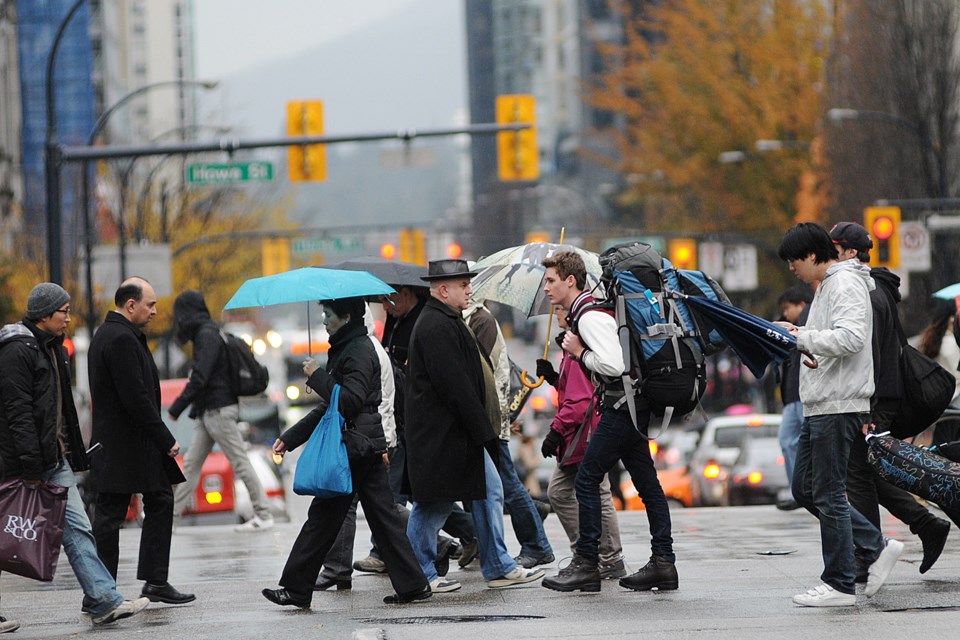A 22-member task force created to find ways city hall can get more residents engaged in civic issues says it has to do more to involve younger people, newcomers and the aboriginal population.
In its report released Jan. 30, the Mayor’s Engaged City Task Force pointed particularly to the lack of aboriginal input in developing strategies to address the disconnect in the city.
“We feel it’s important for us to acknowledge the absence of voices from aboriginal communities in this process,” the report said.
“Many of us participated in the Truth and Reconciliation Commission events held in Vancouver in September 2013 and were reminded of how Canada’s history of colonization continues to have a significant impact on the development of an engaged city.”
The task force pointed out its limitations in its work, which involved discussions to improve such areas as voter turnout, consultation and better engagement of under-represented groups.
“We simply could not meet with as many people and groups as we would have wished,” the report said. “Further, we understand that there are many complex factors affecting engagement, such as social and economic inequality, housing affordability, trust, power, discrimination and a rapidly changing media landscape.”
Dennis Chan, a member of the task force, pointed out one of the top priorities was to develop strategies to better engage urban aboriginal peoples, newcomers, new immigrants and residents 18 to 35 year olds.
“That’s something we wanted the report to make note of and not lose sight of,” Chan told the Courier. “But we recognized this it isn’t something the city can do alone but has to play a big part in. It’s also something that requires a real stake and action from residents.”
The report noted a Vancouver Foundation study titled Connections and Engagement revealed that urban aboriginal people “are more likely than others to feel that they don’t belong in their neighbourhood, and are among the most likely to have experienced discrimination.”
“Clearly, more intentional and culturally competent outreach to these communities will be essential in future engagement efforts,” the task force report said.
Mayor Gregor Robertson was not available for an interview to discuss the report but did issue a brief statement to the Courier via email.
He said the task force deserves credit for recognizing its limitations and being upfront that it wasn’t possible to meet with “every resident, cultural group or organization with an interest in civic engagement.”
“The task force recommendation for the city to have a targeted engagement strategy for youth, urban aboriginals and newcomers and new immigrants reflects the direction we need to go as a city,” said the mayor, who often begins press conferences with acknowledging Vancouver is on the traditional lands of the Coast Salish people.
“I want to make sure the task force’s final report isn’t the end, but rather the beginning of the city undertaking new ways to engage with groups who historically have been under-represented.”
Vision Vancouver Coun. Andrea Reimer, who is council’s liaison to the task force, said she attended several task force meetings in which aboriginal people were in attendance. But Reimer acknowledged none of the 22 task force members was aboriginal.
“There was only one person out of 150 [applicants] who identified as aboriginal and didn’t have the qualifications on the engagement or community development side,” she said, noting she struggled with not including the applicant. “But the committee still has to do the work it has to do and it’s going to need that expertise there.”
The Courier left messages Friday and Monday with three aboriginal leaders, including Susan Tatoosh, executive director of the Vancouver Aboriginal Friendship Centre Society, Wade Grant of the Musqueam Indian Band and school trustee Ken Clement to discuss the report.
None had returned calls prior to the Courier’s deadline.
Council is expected to review the report sometime in March. Meanwhile, residents are urged to provide feedback via email to [email protected]
[email protected]
twitter.com/Howellings



